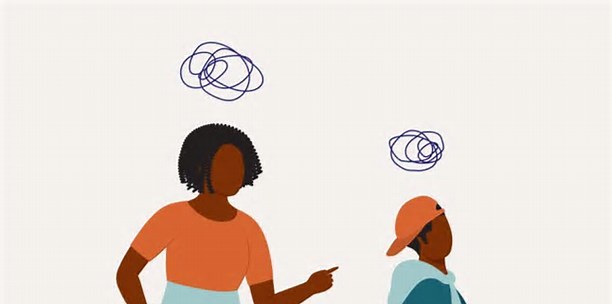Stop Telling Black Children These 5 Things

Dr. Isha Metzger, a psychologist and director of The EMPOWER Lab, spoke with purewow.com about how to change the narrative through language that Black families commonly use.
She shed light on more positive ways to have conversations. Dr. Metzger, a mental health expert dedicated to an anti-deficit prevention approach for youth of color, offered phrases to stop using with Black children and what to say instead.
1. “Don’t Be So Sensitive.”
If your child is feeling upset or angry, Dr. Metzger maintains you need to create a safe space for them to express themselves. It’s important to teach your children, especially Black boys, that it doesn’t make them any less masculine or strong if they are in touch with their emotions. “[Saying ‘Don’t be so sensitive’] minimizes the experiences and emotions of Black and brown children. It implies that their feelings are invalid and that they should toughen up and not show vulnerability, which can lead to suppressing their emotions and feeling isolated,” explains Dr. Metzger. To help validate their feelings and show your support, use phrases like “I understand why you are feeling that way.” or “It’s OK to feel upset.” Metzger added, “This approach helps them feel seen and heard, which leads to stronger relationships and healthier emotional development.”
2. “You Can’t Do that Because You’re [Insert Race].”
We know the reality of the world is that the same rules don’t always apply to white and Black children — and you wouldn’t be alone if you’ve given your kids clear instructions about what to do or not do, say, around the police. Still, “this phrase implies that race is a limiting factor for their abilities or opportunities. And it’s a message that can lead to feelings of hopelessness, anger and frustration among Black and brown children,” Dr. Metzger said. Additionally, she says, it’s important to teach your children that other adults around them (like their teachers, coaches or other family members) shouldn’t be allowed to say it either. “It’s like a coach telling their Black athletes they should focus on sports because they don’t have many other opportunities because of their race, which can demotivate and perpetuate harmful stereotypes.”
3. “I Don’t See Color.”
At the end of the day, our race is part of our identity. It’s what makes us who we are and to dismiss a child’s Blackness and/or their culture is harmful. “This phrase erases the experiences and identities of Black and brown children. It suggests that their race is insignificant and should be ignored, which can make them feel invisible and unheard,” Dr. Metzger said. Instead, the psychologist believes in acknowledging and celebrating race by using phrases like “I’m proud to be Black,” “Isn’t your brown skin so beautiful?,” or “I appreciate our family’s culture so much, would you like to learn more about it?” which boost self-esteem. “These sayings can validate their experiences and promote a sense of pride in their heritage. It can help them develop a positive self-identity and feel more connected to their own communities.”
4. “You’re So Lucky to Have Light Skin or [Insert Eurocentric Feature].”
Colorism is a big issue in BIPOC communities, and it tells children that features like darker skin, wider noses and coiled hair are not beautiful or worthy. And it doesn’t only divide kids who are different from each other at school, but lowers their confidence. “It implies that having lighter skin or any Eurocentric features is more desirable or superior, which can perpetuate negative stereotypes and contribute to internalized racism among Black and Brown children,” Dr. Metzger said. The psychologist instead suggests practicing positive self-talk by saying things like, “You have a beautiful complexion,” or “Your features are unique and special.”
5. “You’re Too Young to Understand.”
In the last few years, we’ve dealt with hard topics like the pandemic, racial violence and gun violence, and it’s easy to want to shelter our children from the world. But curtailing their curiosity or dismissing their questions isn’t OK. “[Telling them they’re too you young to understand] diminishes the intelligence and curiosity of Black and brown children. It implies that they are not capable of understanding complex issues or that their opinions are not valuable, which can lead to feelings of inadequacy and disengagement,” Dr. Metzger said. There are plenty of ways to talk, in age-appropriate ways, about these tough issues, and Dr. Metzger recommends validating their thoughts and opening up the conversation with something like, “that’s a great question,” or “what do you think about this issue?” After all, they’re going to find out about the things that affect our communities somehow—don’t you want it to be from you?
This interview appeared on purewow.com on April 6, 2023.
